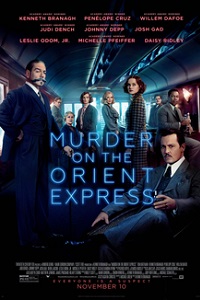♣♣♣♣/♣♣♣♣♣
Belgian detective extraordinaire Hecule Poirot (Kenneth Branagh) is invited by his friend Bouc (Tom Bateman) to ride with him on the Orient Express, the luxury train he is managing on behalf of his uncle. Indulging, he meets a train full of people, but one expresses a certain interest in him. John Cassetti (Johnny Depp) is a self-made man being part of the mafia. Lately, he has been receiving death threats and asks Poirot for help but is declined. The next day, they find him dead in his cabin with multiple stab wounds of varying depths. Suddenly, everybody becomes a suspect. Is it his secretary Hector MacQueen (Josh Gad) who has been secretly stealing from him? Princess Natalia Dragomiroff (Judi Dench), a dear friend of a woman whose child he murdered? The oft drugged couple count Rudolph (Sergei Polunin) and countess Helena Andrenyi (Lucy Boynton) who have exhibited violence prior to boarding? Delayed by an avalanche derailing the train, Poirot strives to resolve the murder case before they reach their destination.
Well, I didn’t expect that twist. Perhaps that is the strength of this particular storyline. You are forced to think what justice in this sense really means. Long story short, the theme is that of the question whether the ends justify the means. Of course it is ultimately up to Poirot to recalibrate his moral compass to decide whether he would be an accomplice or a problem-solver. Since the character has a history of always doing what he believes is right, it is nice to see him embroiled in such a conundrum where there is no black and white but rather all just gray.
I watched this after seeing the sequel Death on the Nile. There seems to be a continuity error in the ending. As Poirot gets off the train he is welcomed by a guy with a placard of his name, telling him that his assistance is urgently required in Egypt because there has been a death in the “bloody Nile”. It is obviously alluding to the sequel, which probably wasn’t greenlit yet at the time of this movie’s release. If you watch Death on the Nile, the death(s) actually occur when both Poirot and Bouc are already on board the Karnak. They did not join that cruise because somebody got murdered.
In any case, I guess a lot of people will be down for such a shared cinematic universe, but maybe it will all depend on your relationship with Poirot’s character. Personally, I find him overbearing most of the time. Although he admits in a meta kind of way that he likes the attention and the satisfaction in solving the crimes, the storyline tends to focus more on him instead of the suspects. What you get in the end is an ensemble of characters that are not given a chance to fully develop their motivations and story arcs, for the mere fact that Poirot is always hogging the spotlight.
Overall, Murder on the Orient Express is still an enjoyable thriller, but after seeing two Agatha Christie novels reimagined through film, it looks like her plots are all the same. They are formulaic at best, and probably works better in written form where you can really dive into the characters and the clues without being restrained by the two-hour runtime. As for comparisons to the 70’s film that won Ingrid Bergman her final Oscar, I cannot really comment on it because I have not seen that film. Now I feel like I want to, though.









0 creature(s) gave a damn:
Post a Comment